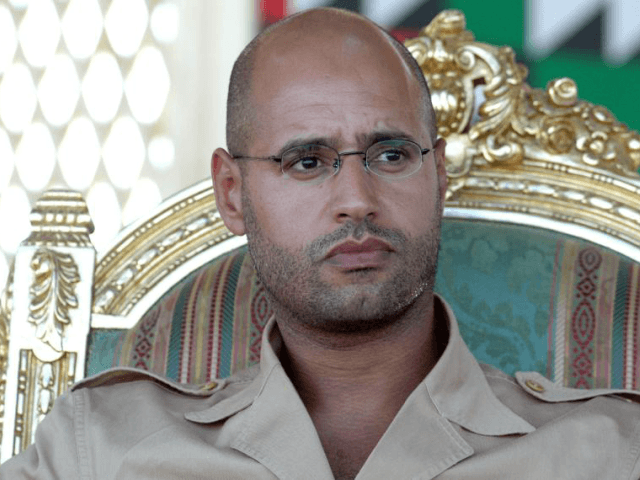Libyan government officials, militia leaders, and officials in states involved in proxy battles there are increasingly concerned Saif al-Islam Qaddafi, son of late dictator Muammar Qaddafi, may run in a presidential election scheduled for December, Voice of America reported Monday.
Saif al-Islam Qaddafi is the most prominent of Qaddafi’s children and the only one believed to be living freely in Libya. He rose to prominence during the uprising in 2011 that resulted in his father’s killing at the hands of an angry mob, greeting journalists in Tripoli to triumphantly — and incorrectly — proclaim his father’s victory shortly before his death.
The younger Qaddafi first faced prosecution from the makeshift government formed after his father was deposed. He was sentenced to death in 2015 but never executed. He fell to the hands of a militia in the city of Zintan for years before being released in 2017 and threatening, through intermediaries, to run for president in the 2018 election.
That election never happened and an amnesty from the legitimately recognized government of Libya did not prevent the International Criminal Court (ICC) at The Hague from charging Saif al-Islam with war crimes. The ICC continues to demand his arrest and prosecution for the alleged war crimes committed during Qaddafi’s rule.
The Government of National Accord (GNA), the internationally recognized government of Libya, has for now agreed to hold elections on December 24, 2021. International media outlets have hinted Saif al-Islam Qaddafi may run for president, citing sources close to him. Qaddafi himself has kept a low profile since his release from militia custody in 2017 and has yet to make any public pronouncements.
Whether Libyans go to the polls in December or not will heavily depend on the extremely volatile situation on the ground in that country by the end of the year. While the GNA enjoys the support of the United Nations and some of the West, it has spent years fighting a quest for territorial control by the Libyan National Army (LNA), a faction led by warlord Khalifa Haftar. A former Qaddafi general, Haftar sold himself as a force of stability to governments like those of Egypt and Russia, who have aided his attempts to conquer GNA territory. Haftar failed to take control of Tripoli in a siege last year after Islamist Turkish President Recep Tayyip Erdogan sent forces into the country to support the GNA. Turkish troops remain there to this day.
In addition to the GNA, Haftar’s army, the Russians, the Egyptians, and the Turks, much of Libya remains in the hands of local militias or jihadist organizations like the Islamic State and al-Qaeda, calling into question the possibility of Libya being able to hold free and fair elections. The GNA nonetheless moved forward this week with setting a date, July 4, for voter registration, and establishing the rules for candidates: all must be Muslim Libyans born of Libyan parents with no dual citizenship.
Libya does not yet have a universally agreed-upon constitution or an election law that details exactly how the process works logistically, leading some within the Tripoli government to demand a constitutional referendum or legislation on elections to pass before holding a presidential vote.
“The prospect of Saif figuring in the elections is unnerving Western diplomats and international democracy advisers,” Voice of America reported Monday, “who say Libya’s troubled peace process has enough major obstacles to overcome without Gadhafi’s son, a highly polarizing figure, getting involved.” The outlet claimed Saif al-Islam was attempting to reach out to international outlets for publicity and had secured a “formal interview” with a “major U.S. newspaper” yet to be published.
The Times, a British newspaper, reported this month that it had made contact with Saif al-Islam himself and he had both confirmed he was “fine” and that he was in the process of “communicating with Western diplomats and other diplomats in order to establish his credentials while returning to public life.” He expressed interest in running for president.
The whispers around the return of the Qaddafi family to Libyan politics mirror the speculation in 2018 when the GNA similarly agreed to hold presidential elections with few, if any, institutions intact. On that occasion, sources close to Qaddafi turned to Bloomberg to share the news that Saif al-Islam was preparing a presidential run. It followed a near-confirmation from a Qaddafi family spokesman, Basem al-Hashimi al-Soul, to Egypt Today that the Qaddafi son would run because he “enjoys the support of major tribes in Libya and he will offer Libyans measures to stabilize the country.” Qaddafi loyalists rapidly began proclaiming to any media outlet available that Saif al-Islam was a “favorite” in the election because the ensuing chaos following his father’s death had left citizens with a desire to return to normalcy.
“Most Libya analysts disagree,” Bloomberg reported at the time.
The speculation proved fruitless as the election never happened. The Islamic State targeted election offices for attack as they planned the national vote and the feud between Haftar’s LNA and the GNA continued unabated.
Experts speaking to Voice of America this week expressed little hope that Libya could pull off a functional election with or without any Qaddafis on the ballot.
“Elections in December are not a very good option for Libya, but unfortunately there is no better one,” Wolfgang Pusztai, a former Austrian diplomat, told the outlet. “The main obstacles on the way to elections are the lack of consensus about a constitutional basis for these elections and the disagreement about the way the president shall be elected.”
“I think the idea of presidential elections is dumb anyway, and internationals should have nipped it in the bud sooner,” Mary Fitzgerald, a researcher at King’s College London, added.

COMMENTS
Please let us know if you're having issues with commenting.